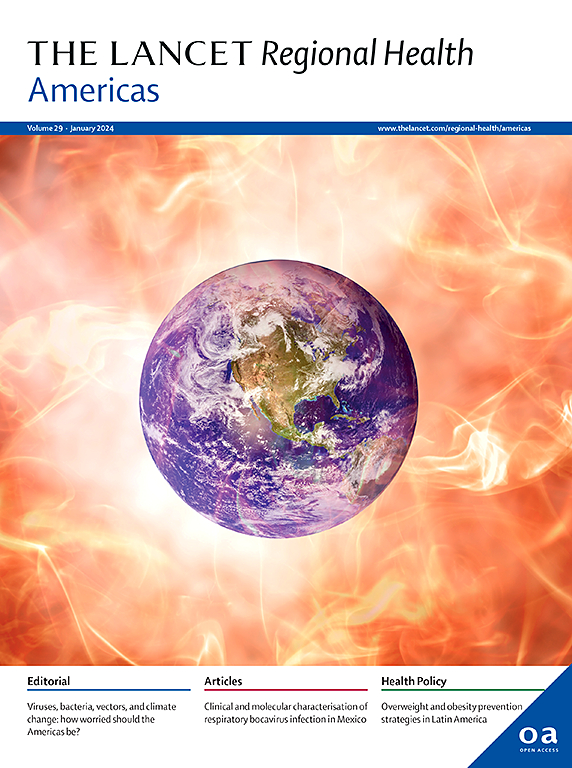Fear, loathing, and support for political violence in the United States: findings from a nationally representative survey
IF 7
Q1 HEALTH CARE SCIENCES & SERVICES
引用次数: 0
Abstract
Background
Racism, hostile sexism, homonegativity, transphobia, xenophobia, antisemitism, and Islamophobia increase risk for perpetration of interpersonal violence generally. We quantify their associations, singly and in combination, with support for and willingness to commit political violence in the United States, at a time of increased concern that such violence may become widespread.
Methods
Findings are from Wave 2 of a nationally representative longitudinal survey, conducted May 18-June 8, 2023. Weighted prevalences of the characteristics under study are estimated from levels of agreement with abbreviated versions of previously validated scales, with missing values imputed using multiple imputation by chained equations. Associations with political violence are expressed as adjusted prevalence differences by level of agreement.
Findings
The survey completion rate was 84.2%; there were 9385 respondents. After weighting, 50.7% (95% CI 49.4%–52.1%) of respondents were female; 62.7% (95% CI 61.2%–64.1%) were white, non-Hispanic; the weighted mean (SD) age was 48.5 (25.9) years. Prevalences of strong agreement ranged from 2.9% (95% CI 2.4%–3.4%) for antisemitism to 26.6% (95% CI 25.4%–27.8%) for homonegativity. In all cases, significantly higher percentages of persons in strong agreement than in non-agreement supported and were willing to commit political violence; the largest differences were for Islamophobia and hostile sexism. Less prevalent characteristics tended to have stronger associations with political violence. Associations were larger when characteristics were combined in a single measure.
Interpretation
Racism, hostile sexism, homonegativity, transphobia, xenophobia, antisemitism, and Islamophobia were each strongly associated with support for and willingness to commit political violence in the United States. Such characteristics are resistant to change; prevention efforts should also seek to uncouple them from associated violent behaviors.
Funding
Supported by grants from the Joyce Foundation, California Wellness Foundation, and Heising-Simons Foundation, and by the California Firearm Violence Research Center Violence Prevention Research Program, both at the University of California, Davis.
对美国政治暴力的恐惧、厌恶和支持:来自一项全国代表性调查的结果
背景主义、敌意的性别歧视、同性恋负面情绪、跨性别恐惧症、仇外心理、反犹太主义和伊斯兰恐惧症通常会增加人际暴力发生的风险。我们量化了他们与支持和愿意在美国实施政治暴力的联系,无论是单独的还是联合的,目前人们越来越担心这种暴力可能会变得普遍。方法研究结果来自一项全国代表性纵向调查的第二波,该调查于2023年5月18日至6月8日进行。所研究的特征的加权患病率是根据与先前验证的量表的简化版本的一致程度来估计的,缺失值是通过链式方程使用多重imputation来估算的。与政治暴力的关联表示为按认同程度调整的流行率差异。调查完成率为84.2%;共有9385名受访者。加权后,50.7% (95% CI 49.4%-52.1%)的受访者为女性;62.7% (95% CI 61.2%-64.1%)为白人,非西班牙裔;加权平均(SD)年龄为48.5(25.9)岁。强烈认同的流行率从2.9% (95% CI 2.4%-3.4%)的反犹太主义到26.6% (95% CI 25.4%-27.8%)的反同性恋主义。在所有情况下,强烈同意的人比不同意的人支持并愿意实施政治暴力的比例要高得多;最大的差异是伊斯兰恐惧症和敌意性别歧视。不太普遍的特征往往与政治暴力有更强的联系。当特征结合在一个单一的测量时,关联更大。种族主义、敌意的性别歧视、同性恋负面情绪、跨性别恐惧症、仇外心理、反犹主义和伊斯兰恐惧症都与美国政治暴力的支持和意愿密切相关。这些特征是抗拒改变的;预防工作还应设法使他们脱离相关的暴力行为。由乔伊斯基金会、加州健康基金会和海辛-西蒙斯基金会以及加州枪支暴力研究中心暴力预防研究项目资助,这两个项目都位于加州大学戴维斯分校。
本文章由计算机程序翻译,如有差异,请以英文原文为准。
求助全文
约1分钟内获得全文
求助全文
来源期刊

Lancet Regional Health-Americas
Multiple-
CiteScore
8.00
自引率
0.00%
发文量
0
期刊介绍:
The Lancet Regional Health – Americas, an open-access journal, contributes to The Lancet's global initiative by focusing on health-care quality and access in the Americas. It aims to advance clinical practice and health policy in the region, promoting better health outcomes. The journal publishes high-quality original research advocating change or shedding light on clinical practice and health policy. It welcomes submissions on various regional health topics, including infectious diseases, non-communicable diseases, child and adolescent health, maternal and reproductive health, emergency care, health policy, and health equity.
 求助内容:
求助内容: 应助结果提醒方式:
应助结果提醒方式:


